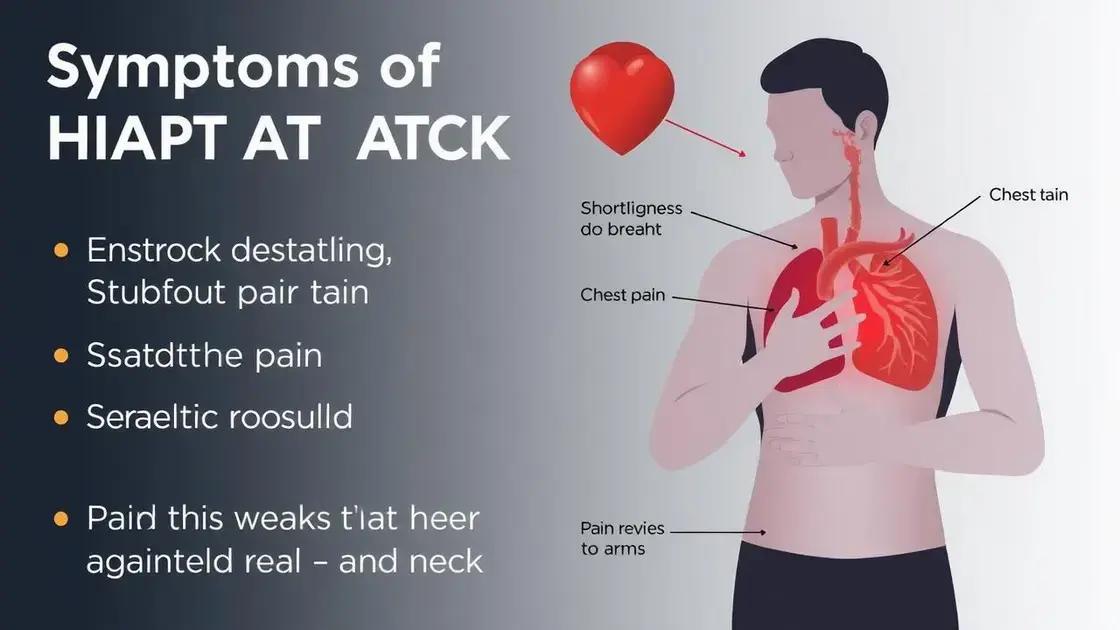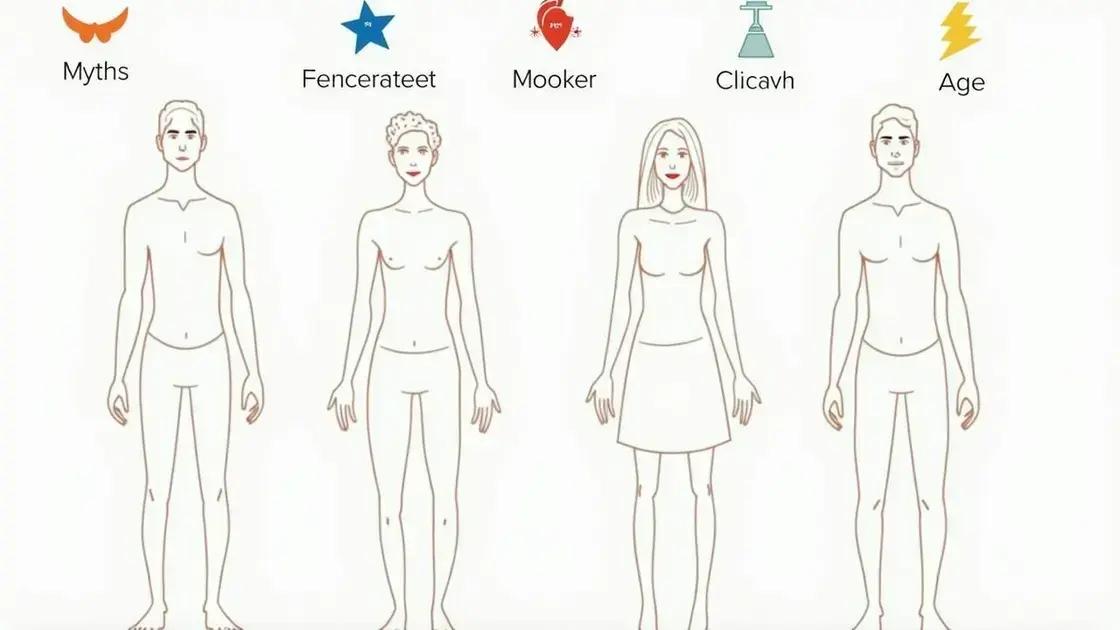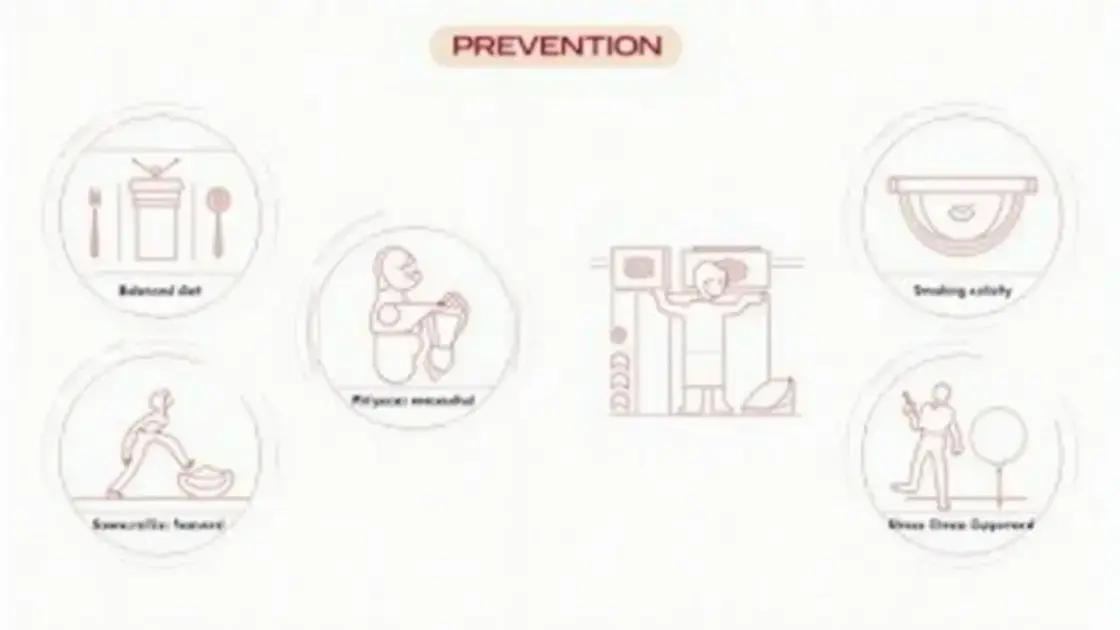Recognizing the warning signs of a heart attack is essential for prompt medical help. Common symptoms include chest discomfort, shortness of breath, and discomfort in other areas like your arms or jaw. Prevention involves maintaining a healthy diet, regular exercise, and avoiding tobacco. When experiencing symptoms, call emergency services immediately and stay calm. Understanding these aspects can significantly improve outcomes for those at risk of heart attacks.
Recognizing the warning signs of a heart attack can save a life. Often, individuals dismiss key symptoms as anxiety or indigestion. However, being aware of these crucial indicators can lead to prompt medical attention and potentially life-saving interventions. In this article, we will delve deeper into understanding heart attack symptoms, debunk common misconceptions about heart attacks, and provide essential first steps to take when experiencing these signs. Additionally, we will cover effective prevention tips to maintain a healthy heart.
Understanding Heart Attack Symptoms

Heart attack symptoms can vary from person to person, but there are some common signs you should be aware of.
Common Symptoms
Many people associate heart attacks only with severe chest pain. However, symptoms can also include:
- Chest discomfort: This may feel like pressure, squeezing, fullness, or pain.
- Pain in other areas: Pain or discomfort can radiate to the shoulders, neck, arms, back, teeth, or jaw.
- Shortness of breath: This may occur with or without chest discomfort.
- Other signs: Nausea, lightheadedness, or cold sweats.
Identifying Silent Heart Attacks
Some heart attacks are silent and do not show obvious symptoms. This is especially true for women. It’s essential to listen to your body and seek medical advice if you feel unwell.
Timing is Crucial
If you or someone else experiences these symptoms, do not wait to see if they go away. It’s essential to act quickly. Call emergency services immediately.
Know Your Risk Factors
Understanding your risk factors can help in early detection:
- Age: Risk increases with age.
- Family history: A family history of heart disease can elevate your risk.
- High blood pressure or cholesterol: These can significantly increase your chance of having a heart attack.
Staying informed and recognizing these symptoms can lead to better outcomes if a heart attack occurs.
Common Misconceptions About Heart Attacks

Many people hold misconceptions about heart attacks that can lead to confusion and misinformation. Understanding these misconceptions is essential for recognizing the warning signs and taking appropriate action.
Myth 1: Heart Attacks Only Happen to Older People
While age is a risk factor, heart attacks can occur at any age. Younger individuals can also experience heart issues, especially if they have other risk factors.
Myth 2: Heart Attacks Are Always Accompanied by Severe Pain
Not true! Some heart attacks come with mild or vague symptoms. People may feel discomfort that isn’t severe, leading them to ignore it.
Myth 3: Only Men Get Heart Attacks
Heart attacks affect both men and women. Women may experience different symptoms, which can make it harder to recognize a heart attack.
Myth 4: You Will Always Know When You Are Having a Heart Attack
Some heart attacks are silent, meaning no obvious symptoms are present. This is especially common in women and those with diabetes.
Myth 5: Heart Attacks Can Be Predicted
While monitoring health can help assess risk, there is no guarantee that heart attacks can be predicted. Staying informed about symptoms and risk factors is crucial.
By debunking these misconceptions, individuals can be better prepared to recognize genuine symptoms and respond appropriately.
First Steps When Experiencing Symptoms

When experiencing symptoms of a heart attack, knowing what to do can make a big difference. Acting fast is essential.
1. Recognize the Symptoms
If you notice any signs, such as chest discomfort, shortness of breath, or pain in your arms, take these symptoms seriously. Many people hesitate, thinking it might be nothing.
2. Call for Help
Do not wait! Call emergency services immediately. If you suspect you are having a heart attack, it is vital to get professional medical help right away.
3. Stay Calm
While waiting for help, try to stay calm. Panic can increase heart rate and discomfort. If possible, sit or lie down in a comfortable position.
4. Avoid Food and Drink
Do not eat or drink anything while you wait for help. Consuming food or liquids can complicate treatment once you receive medical care.
5. Inform Someone
If you are not alone, let someone else know what you are feeling. They can assist in contacting help and provide support during this stressful time.
Acting quickly and following these steps can be life-saving when experiencing symptoms of a heart attack.
Prevention Tips for Heart Health

Maintaining heart health is essential for preventing heart attacks. Here are some prevention tips that can help you keep your heart in good condition.
1. Eat a Healthy Diet
Focus on a balanced diet that includes plenty of fruits, vegetables, whole grains, and lean proteins. Limit saturated fats, trans fats, and high sugar foods as they can raise cholesterol and blood pressure.
2. Stay Active
Regular physical activity is vital for a healthy heart. Aim for at least 30 minutes of moderate exercise most days of the week. Activities like walking, swimming, or cycling are great options.
3. Maintain a Healthy Weight
Being overweight increases the risk of heart disease. Keeping a healthy weight through diet and exercise can lower this risk significantly.
4. Avoid Tobacco and Excessive Alcohol
Quitting smoking is one of the best things you can do for your heart. Also, limit alcohol intake to moderate levels—no more than one drink per day for women and two for men.
5. Manage Stress
Chronic stress may contribute to heart disease. Practice stress management techniques such as meditation, yoga, or deep breathing exercises.
6. Regular Check-Ups
Visit your doctor regularly to monitor your blood pressure, cholesterol, and overall heart health. Early detection of issues can help you take action before they become serious.
Following these heart health tips can help you reduce your risk of heart attacks and ensure long-lasting wellness.
Understanding and Preventing Heart Attacks
Being informed about the warning signs of heart attacks is crucial for prompt action. Recognizing symptoms, debunking misconceptions, and knowing the first steps to take can save lives.
Additionally, prevention tips such as maintaining a healthy diet, staying active, avoiding tobacco, and managing stress play a significant role in promoting heart health.
By taking these steps, you can empower yourself and others to recognize the signs and reduce the risk of heart attacks. Prioritizing heart health is essential for a long and healthy life.
FAQ – Frequently Asked Questions About Heart Attacks
What are the common symptoms of a heart attack?
Common symptoms include chest discomfort, shortness of breath, pain in the arms, back, neck, or jaw, and other signs like nausea.
Are heart attacks only a concern for older people?
No, heart attacks can occur at any age, especially if there are other risk factors present.
What should I do if I experience symptoms of a heart attack?
Call emergency services immediately, stay calm, inform someone nearby, and avoid eating or drinking anything.
How can I help prevent heart attacks?
Preventative measures include eating a healthy diet, exercising regularly, quitting smoking, managing stress, and having regular check-ups with your doctor.
Can women experience different symptoms compared to men?
Yes, women may experience different or more subtle symptoms, making it essential to be vigilant regardless of gender.
Is it true that heart attacks are always accompanied by severe pain?
No, some heart attacks may come with mild or vague symptoms, which can lead to delays in seeking help.













